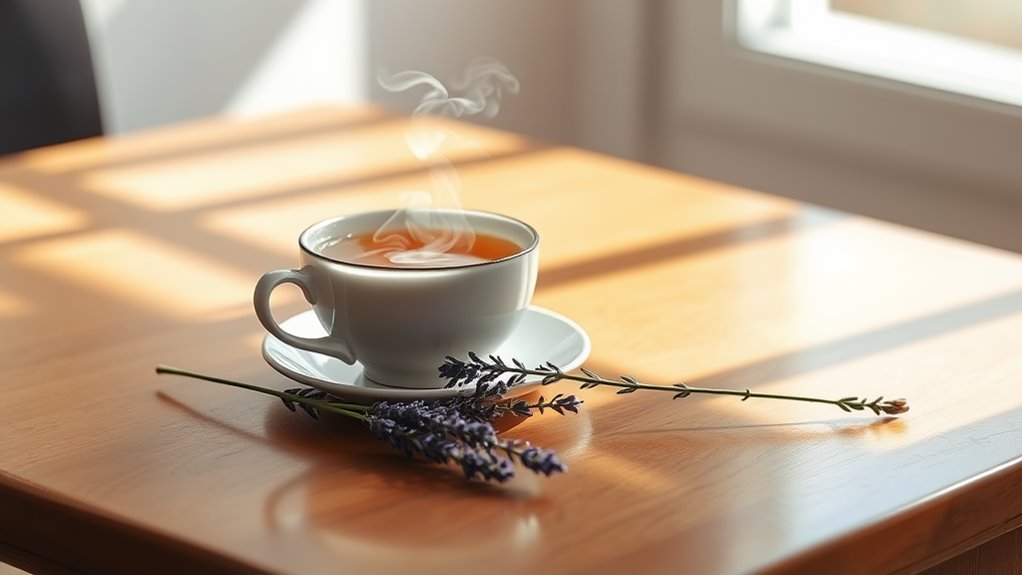
Simple stress relief strategies are vital because they markedly boost your mental and physical health without requiring complex resources. By practicing techniques like mindfulness meditation, deep breathing, or engaging in physical activities, you reduce anxiety and enhance emotional resilience. These strategies lower stress hormone levels, improve sleep, and foster concentration, helping you manage life’s demands with a clearer mindset. Social connections and a balanced lifestyle also play an important role in stress management, promoting overall well-being. Embracing these readily accessible methods can transform your response to stress, making life’s challenges more manageable and rewarding. Discover further to enhance your journey.
Importance for Physical Health
Physical activity plays a significant role in maintaining good physical health. It not only boosts your physical fitness, making you feel stronger and more energetic, but also serves as a powerful tool for stress reduction. Engaging in aerobic exercises like jogging or cycling revitalizes your cardiovascular system and slashes your risk of chronic ailments like heart disease. Immerse yourself in the liberating world of swimming, which enhances your cardiovascular health without straining your body—an exercise as relaxed as it’s powerful. Regular physical activity also lowers stress hormone levels over time, contributing to reduced stress. In addition to these benefits, regular exercise can significantly enhance mood stability and contribute to long-term emotional resilience. Brisk walking is your accessible ticket to special cardiovascular benefits, requiring only a commitment to at least 150 minutes a week to transform your heart health. Imagine feeling the wind on your face as stress evaporates with every step you take. Meanwhile, integrating strength training into your routine twice a week fortifies your bones and muscles. Whether lifting weights or stretching with resistance bands, you’ll build a resilient musculoskeletal system. With each move, you enhance your metabolic health, keeping ailments like diabetes at bay and maintaining your weight—an essential path to freedom and wellness.
Mental Health Benefits
Amidst the hustle and bustle of daily life, tending to your mental health can transform your overall well-being. Simple stress relief strategies like mindfulness meditation offer immense mindfulness benefits. They can effectively reduce anxiety and depression by soothing the mind and even improving your sleep.
Just a few moments each day spent meditating can bring peace, help clear your thoughts, and guide you into a refreshed state. Techniques such as guided imagery and breath focus help envision a more positive self, fostering emotional resilience against stress. Regular interactions with animals can provide comfort and improve mood, as cuddling with pets boosts self-esteem and reduces stress.
Engaging in gentle activities like yoga, tai chi, or qigong not only provides a mental distraction but also enhances calmness and focus. These activities merge movement with rhythmic breathing, helping you disconnect from racing thoughts and build emotional resilience. In addition, exercises that lower cortisol levels contribute to speedy recovery from stress and improve overall hormonal balance.
Meanwhile, cognitive benefits like improved concentration arise from practices such as progressive muscle relaxation and body scanning. Creative pursuits, such as solving puzzles or painting, can also lift mental clarity, offering an escape from everyday stresses.
Effective Stress Management

You can manage stress effectively by incorporating deep breathing techniques that trigger relaxation. Engaging in mindfulness and meditation helps you focus on the present, reducing anxiety and promoting mental clarity. Regular physical activity boosts your mood and provides a healthy outlet for relieving stress. A balanced diet plays a crucial role in mental health and stress management.
Deep Breathing Techniques
Deep breathing exercises are a powerful tool for effective stress management. When you engage in these techniques, you trigger a relaxation response that calms your entire system. By sending a direct signal to your brain, deep breathing can help you unwind, lowering your heart rate and boosting oxygen levels for a rejuvenating sense of peace.
This simple act prevents carbon dioxide from building up, which is essential since too much can make you feel edgy and unsettled.
To practice, lie on your back or sit comfortably, ensuring support for your shoulders, head, and neck. Place one hand on your belly and the other on your chest to feel the rise and fall as you inhale through your nose, filling your belly. Exhale slowly, also through your nose.
Techniques like belly breathing or equal time breathing focus on expanding your belly, helping you keep track of the rhythm of your breath.
Incorporate these exercises into your daily routine, perhaps three to four times a day for 10 minutes each. Start lying down and gradually progress to sitting or standing as confidence grows.
Just like that, freedom from stress can be just a breath away.
Mindfulness and Meditation
While deep breathing provides immediate stress relief, integrating mindfulness and meditation adds a profound layer of emotional and mental balance. By embracing mindfulness benefits, you can reduce anxiety and tackle depressive symptoms effectively. Techniques like mindfulness-based stress reduction (MBSR) and mindfulness-based cognitive therapy (MBCT) help manage anxiety, depression, and even prevent depressive relapses.
Imagine experiencing an eight-week MBSR program where participants report considerably less anxiety than a control group.
Mindfulness meditation doesn’t just soothe the psyche; it sharpens your cognitive edge. Through consistent practice, you’ll notice enhanced attentional capacities and working memory. Meditation techniques improve performance in tasks requiring attention and cognitive flexibility.
When practiced consistently over six to nine months, it can lead to a remarkable 60% decrease in anxiety levels.
Liberate yourself from emotional reactivity with mindfulness meditation. Studies show it reduces the neural response to emotional stressors, enabling you to face life with calm clarity. As 35% of people meditate primarily to combat stress, the effectiveness of these practices can’t be overstated.
Mindfulness offers a holistic path to lower stress and improve both mental and physical health outcomes. Why not embrace this empowering journey today?
Physical Activity Benefits
Amid the pressures of daily life, physical activity emerges as a powerful tool for managing stress effectively. When you engage in exercise, you’re not just burning calories; you’re boosting physical energy. It reduces stress hormones like adrenaline and cortisol while increasing the production of feel-good endorphins, the brain’s natural stress relievers. These endorphins foster relaxation and optimism, creating what many refer to as a ‘runner’s high’. This hormonal uplift equips your body to handle stress more efficiently and keeps your mood elevated.
Exercise isn’t only about physical benefits; it also liberates your mind. By offering a break from stressors, exercise helps clear mental fog. It builds self-esteem as you gain strength, stamina, and discipline, thereby reducing anxiety and depression. Regular activity provides a constructive outlet for processing thoughts, restoring focus, and nurturing self-confidence.
Choosing an exercise variety keeps your routine exciting and sustainable, preventing monotony. Options like brisk walks, swimming, or weightlifting all contribute to better sleep, heart health, and immunity.
Even short, enjoyable bursts of activity help manage stress. Exercising with others amplifies these benefits, turning your routine into a joyful liberation from stress.
Lifestyle Modifications
To effectively manage stress, start by focusing on balanced nutrition, ensuring you’re eating mostly plant-based meals and not skipping breakfast. Prioritizing sleep quality is also essential; aim for at least seven hours of rest each night to support your overall well-being. Reduce caffeine and sugar intake to help stabilize your mood and energy levels, making daily stressors easier to handle. Incorporating herbal teas like Valerian Root into your routine can also aid in reducing stress and promoting relaxation due to their calming properties and influences on neurotransmitter levels.
Balanced Nutrition Importance
Balanced nutrition plays an essential role in stress management by supporting both physical and mental well-being. By focusing on meal timing and nutrient variety, you’ll maintain stable blood glucose levels, which reduces stress and boosts performance. Eating regularly prevents those pesky sugar highs and lows, saving you from the rollercoaster that stresses your mind and body.
When you skip meals, you’re not just hungry later; you’re inviting chaos into your day with poor food choices and energy crashes.
Embracing a diet full of nutrient-dense foods liberates your body from stress’s grasp. Omega-3 fatty acids from walnuts and fatty fish, antioxidants from blueberries and leafy greens, and magnesium-rich spinach work wonders in reducing stress hormones, enhancing alertness, and combating fatigue.
These nutrients help you fight stress on a cellular level, offering you freedom from its grasp.
On the flip side, avoiding stress-inducing foods like sugar-heavy snacks or excessive caffeine is vital. These only lead to sluggishness, anxiety, and long-term health issues.
Sleep Quality Impact
Quality sleep is a cornerstone of effective stress management and overall well-being. When you experience sleep disturbances, stress levels rise, making it essential to explore relaxation methods that can enhance your sleep quality.
Mindfulness meditation allows you to break free from racing thoughts that keep you up at night, promoting relaxation and easing you into restful sleep. Deep breathing exercises activate your body’s relaxation response, slowing your breathing and helping you unwind.
You can liberate your body and mind from tension with techniques like Progressive Muscle Relaxation (PMR), systematically working through muscle groups.
Encounter the freedom of a peaceful night’s sleep by committing to a consistent sleep schedule, aligning your internal clock with nature’s rhythm. Incorporating a relaxing bedtime routine, perhaps enriched with a hot bath or calming activities like reading, signals your body that it’s time to wind down.
Craft a sanctuary for sleep by optimizing your environment—keep it dark, quiet, and cool. Engage in daytime habits such as regular exercise, spending time outdoors, and processing daily worries in the sunlight.
Caffeine and Sugar Reduction
Striking a balance in your diet can considerably reduce stress and anxiety by decreasing caffeine and sugar intake. The rollercoaster of emotions fueled by caffeine starts with a high and crashes into fatigue. Minimizing caffeine can stabilize your mood, lift spirits, and curb those restless nights.
With heightened cortisol levels causing chaos, choosing caffeine alternatives can liberate your nervous system from relentless jitteriness.
High sugar intake plays its part by firing anxiety and mood swings through blood sugar spikes. A steady hand on your sugar cravings, replacing sugary snacks with nutritious options, could map a path to serenity.
Here are some practical steps:
- Consider switching to decaf or caffeine-free herbal teas to limit caffeine exposure.
- Opt for sparkling water with lime as a revitalizing caffeine substitute.
- Fruits and whole grains serve as healthier alternatives to sugary treats.
- Choose natural sweeteners like stevia or monk fruit to satisfy your sweet tooth.
Social and Emotional Support

Social and emotional support play an essential role in reducing stress and improving mental health. Cultivating peer connections builds emotional resilience, empowering you to handle stress with more ease and confidence. When you surround yourself with supportive friends and family, you’re more equipped to face life’s challenges. In fact, over three-quarters of adults in the US experience social support, and this positively impacts anxiety, depression, and stress levels.
| Demographics | Higher Support (%) | Lower Support (%) |
|————————|————————|———————–|
| Non-Hispanic White | 81.2 | — |
| Hispanic | — | 70.9 |
| Married/Cohabiting | Higher Support | — |
| Adults with Disabilities| — | 65.5 |
Demographic factors affect the presence of support. Married adults generally get more support, but disparities exist, with Hispanics and adults with disabilities often receiving less. You should endeavor to reach out, as support boosts resilience and overall well-being. Participation in group sports or fitness classes can also enhance social connections while promoting physical and mental health. Despite challenges, nearly half of all adults express a desire for greater assistance in managing stress. Embracing a vibrant and supportive social network shields you against stress, promoting healthier choices and improved mental health outcomes. Break free from isolation, and let strong connections empower and enhance your life.
Immediate Stress Relief Techniques
While cultivating supportive relationships is essential for managing stress, it’s equally important to have immediate techniques at your disposal to address anxiety in the moment. Quick fixes like breathing exercises offer a liberating path to instant relief, grounding you in times of chaos.
For instance, deep breathing allows you to draw slow, deliberate breaths from your lower belly, lowering your heart rate and soothing your mind. Square breathing, with its rhythmic inhale and hold pattern, acts almost like a meditative anchor, centering your thoughts through repetition.
Here’s how you can take action immediately:
- Progressive Muscle Relaxation: Tighten and then release each muscle group for a wave of relaxation.
- Guided Imagery: Envision a serene haven, engaging all your senses to make tranquility feel tangible.
- Chew Gum: It may seem simple, but vigorous chewing, especially of scented gum, dispels tension.
- Sip Green Tea: This not only calms anger but also reduces stress with the help of L-Theanine.
These techniques are designed for immediate implementation, placing you back in control, and propelling you toward a state of inner calm.
Simple Daily Practices

Incorporating a few simple daily practices into your life can greatly reduce stress and improve overall well-being. Start with gratitude journaling, a powerful tool that shifts your focus from stress to appreciation. Spend just a few minutes each morning writing down what you’re thankful for. This practice can elevate your mood and cultivate a positive mindset, freeing you from the shackles of negativity.
Nature walks are another liberating practice you can easily adopt. Stepping outside and immersing yourself in nature helps clear your mind and boosts your endorphins. Aim for at least 150 minutes of such movement a week, even breaking it into short bursts if needed.
These walks can lead to increased energy and a rejuvenated spirit, essential for tackling daily challenges.
Fuel your body with a balanced, mainly plant-based diet, which supports stress resilience. Limit caffeine and sugar to avoid those dreaded mood swings.
Prioritize adequate sleep, aiming for seven hours to awaken refreshed and ready to conquer the day.














